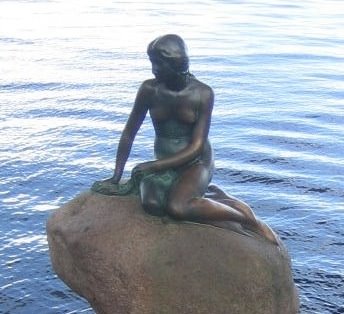Sometimes there is so much to think about or write about that I can't keep up, even when it's my homework to.
We had a small dinner party tonight, with some work friends of Eva's. Denmark, it seems, has a history of "squatting"--that is to say, people taking over a building or an area and claiming it as theirs even though they have no legal right to it. Christiania is one example; Dannerhuset is another. This concept I've always seen translated as "squatting," yet I think for Danes the idea has much less negative connotations. In searching for the right word, our conversation moved on to the topic of the settlers of the American west, and I extrapolated on some of the nuances of how American history is taught. It is fully recognized (in the schools I attended at least, which are of a high caliber) that white colonists and settlers in North America did terrible things to the Indians, that we stole their land, exposed them to new diseases that their bodies were unprepared to deal with, and provided for a culture of alcoholism in many of their communities. At the same time, however, westward expansion continues to be considered a positive part of American history. Today California and New York about equally shape national character. No one wants to imagine a United States of America that did not extend west of the Mississippi. We critique the ideology of Manifest Destiny, but continue to use neutral, if not positive, terms-settlers, settling, development, civilizing-to describe what happened. I would never--until now--consider the brave families who headed west along the Oregon Trail to start a new life "squatters" when they settled down in Oregon. Yet basically that's what they (and the early colonists, etc etc etc) were doing. Establishing themselves on land that was not theirs to claim, and refusing to leave. Other countries often teach stereotypes and misconceptions about America, but sometimes a foreign perspective is illuminating. (They didn't seem to be judging America, because they have done to the Greenlanders as we have done to the Indians, but their perspective was somewhat more objective.)
As Eva works with autistic kids and people who work with autistic kids, we eventually started discussing autism and Asperger's syndrome. I was incredibly impressed by these Danes ability to discuss this issue in English, for my sake. Diagnosis has gone up significantly in recent years; the reasons behind this and the effects of this I think may be an interesting topic for my health care paper. Perhaps because I live with someone who works with autistic kids, but from what I hear autism seems surprisingly prevalent in Denmark. Yet people with autism and Asperger's are uncomfortable with the core Danish value of "hygge." I wonder about the effect of cultural contexts on such conditions...
Subscribe to:
Post Comments (Atom)

1 comment:
Congratulations! You'evidently made a good choice in choosing DIS. A study abroad experience should be "whelming," and cause you to take a new look at old ideas, and give you a new perspective, and stretch you and give you lots and lots of food for thought. Keep up the good work!
You didn't say What Eva and the others think about squatters. Do they think it's justifiable and acceptable, or do they find it wrong, or objectionable and think squatters should face legal consequences?
Post a Comment